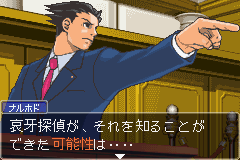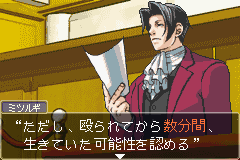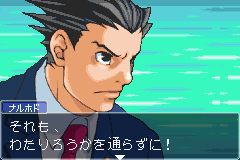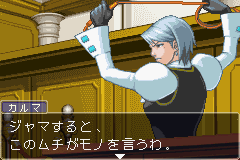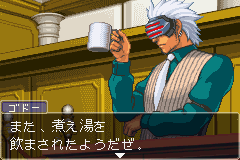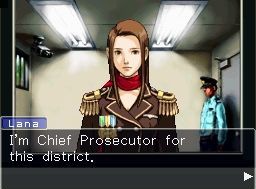

When one thinks of lawyers, one hardly thinks of excitement. The legal system is a gigantic bureaucracy, full of legal red tape and other bits of mumbo jumbo. Lawyers are still the butt of jokes everywhere. While reality likes to present lawyers as either boring know-it-alls or shifty ambulance chasers, we still tend to romanticize the concept, because it sounds like it might be exciting. Television likes to present courtroom proceedings with hard drama (with the likes of Law and Order) or bizarre quirkiness (Ally McBeal), or outright parodied with Harvey Birdman.
When it was first released in English, Phoenix Wright: Ace Attorney was classified as a "lawyer sim", but that's not entirely true. Phoenix is a defense attorney whose job it is to defend witnesses on trumped-up murder charges. But thankfully, you don't need any prior legal knowledge, because the game world kind of makes up its own rules anyway. The entire court system consists of bizarre rules that only work because it's a video game - defendants are guilty until otherwise proved innocent, cases can last no longer than three days, and your clients can be found guilty if you annoy the judge too often. On that note, the Judge is hardly impartial - he's easily swooned by attractive female witnesses or intimidated by brute force. If you answer a question incorrectly or provide incorrect evidence, he'll penalize you, which will eventually end the game. The entire world is set up so it's working against you, and it's not easy.
Phoenix Wright is very much like a traditional adventure game, a genre which has been effectively dead since the mid 90s, but has recently seen a small resurgence. Much of your time is spent investigating the crime scene, interrogating witnesses and gathering evidence.The real action takes place in the courtroom, where you need to listen to testimonies, examine them carefully for contradictions, and present evidence that supports your claims. There's no action anywhere - it's all about reading and puzzle solving. But these aren't the "find the eagle crest" or "slide the tiles" type of puzzles weren't used to (and sick of) from your typical Capcom games - they're logical challenges which require careful examinations of the presented facts. Each case is a complete story that usually take a few hours each to complete. Thankfully, you can save the game anywhere you want.
All of this would still be fairly cut and dry, if it weren't for the gloriously over-the-top presentation. Capcom has taken the concept of a courtroom battle and elevated it to entirely new heights. The defending and prosecuting attorneys aren't merely suits with expensive educations, they're presented as warriors fated to opposing sides due to their professions. Each objection is a swift strike with a sword, the whole trial playing out like an elegant, duel of wits. Accusations are delivered with dramatic close-ups complimented with speed lines, while the camera pans back and forth between prosecutor, defender, and judge, who pounds his gavel furiously to bring things back in order. When you find holes in witness testimonies, the music ramps up, eventually exploding in intensity as the witness breaks down, complete with the visceral sounds of wounded flesh.
Phoenix Wright certainly feels like a bona fide Capcom game - the soundtrack (at least in the first two games) are done by veteran composers Akemi Kimura and Masakazu Sugimori (who both worked on various Mega Man X and Viewtiful Joe titles) and the character designs are courtesy of Edayan, mostly known for his distinctive artwork for Rival Schools/Project Justice.
The major problems with the Phoenix Wright games crop up due to their linearity - there are almost never instances where the game deviates from the set path, so they hardly provide any replay value. This can get frustrating in the event that you lose a case, since you need to start from the beginning of the chapter - and skipping through all of the same text is pretty tedious. It doesn't help that the game absolutely requires that you present the correct evidence at the exact part of the testimony. It doesn't matter if the explanation is vaguely plausible, or if you simply presented evidence too early - if you don't follow the game's exact scripting, you'll get penalized. Some kind of dialogue trees in these cases would've been nice.
Similarly, there are times where they tend to lead you by the nose a little often. The Japanese name is "Gyakuten Saiban", which means "Turnabout Courtroom" - so the game often plunges you into situations where it feels like you're going to lose, and then sometimes magically comes up to save the day. It's all for the sake of drama, but on a few occasions, it feels a little bit too scripted. Still, games like these live and die on the quality of the writing, and the plotlines and characters are so amusing that it makes the game completely irresistible. It's amazing how the game manages to balance humor and drama - it will flip between goofy and serious at a moments notice. This is rare in other media, let alone video gaming.
Phoenix Wright also has a huge cast of characters with particularly goofy names. However, many of them rely on silly puns which don't translate well into English. As much as it may irritate purists, all of the names have been altered in order to capture the same sentiment. Sometimes the meaning is pretty much the same, other times they just pick a silly name.
The first Gyakuten Saiban was released in Japan for the Gameboy Advance in 2001. The game found a reasonable following, and two sequels were made. However, the quirky court proceedings and text heavy gameplay were seemed inappropriate for audiences outside of Japan. Thankfully, in 2005, Capcom rereleased the original game for the Nintendo DS and translated it into English. Initially, it seemed to have sold rather poorly, but word of mouth soon spread, and gamers began snatching it up like crazy. For many months after release, it was nearly impossible to find a copy on American shelves, with online auctions selling it at over twice the retail price. After several reprintings, Capcom acknowledged that the series had enough of an English fan base to port the rest of the series to the DS and release them worldwide. In addition to the original Gameboy Advance and their DS ports, they also appear on mobile platforms, as well as the PC, in different territories. The first game is also available as a downloadable WiiWare title, with more to come, although they're just straight ports of the DS games with added pointer functionality.
What follows are storyline summaries and character biographies of each of the three games. Keep in mind that there some minor spoilers ahead, although I've attempted to skirt around all of the major stuff. Just be warned if that kind of thing bothers you.
Gyakuten Saiban
Gyakuten Saiban
Gyakuten Saiban
Gyakuten Saiban
Gyakuten Saiban 2
Gyakuten Saiban 3
Phoenix Wright: Ace Attorney (DS)
Phoenix Wright: Ace Attorney (DS)
By Kurt Kalata, Sotenga and Jason Withrow

